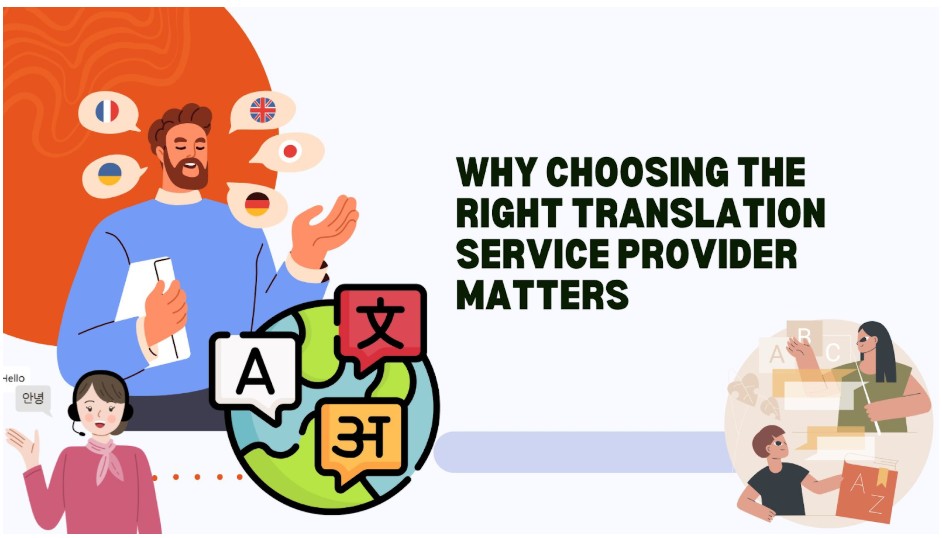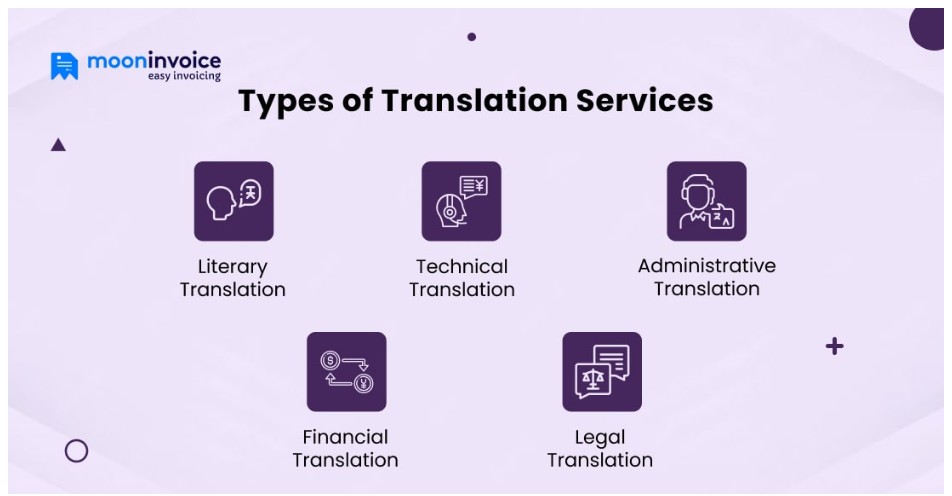How to Choose the Right Translation Service for Your Industry

In today’s global economy, clear communication across languages is essential, and choosing the right voice translator or translation service can protect your reputation.
In fields like healthcare, law, e-commerce, or manufacturing, even one error can lead to serious consequences.
This guide helps you find a translation partner that fits your industry and ensures high-quality results.
A single mistranslation could lead to legal issues, medical errors, or lost customers. That’s why selecting a translation provider tailored to your specific industry is crucial.
Different Types of Translation Services

There are several types of translation services, and the right one depends on your content and industry:
Document Translation: For manuals, contracts, reports, etc.
Website Localisation: Adapting content, visuals, and layout for foreign audiences.
Interpretation: Real-time spoken language services, either in-person or via video/phone.
Certified Translations: Required for legal and government documents.
Software and App Localisation: Translating user interfaces, help files, and in-app content.
Subtitling and Transcription: For videos, training materials, and marketing content.
Choosing a service that specialises in your type of content ensures better accuracy and relevance.
Factors to Consider When Choosing a Provider
Choosing the right translation service provider is critical to ensuring your message is accurately and professionally delivered across different languages and cultures. Here are the key factors you should evaluate when making your decision:
Industry Expertise
Every industry has its own set of terms, regulatory requirements, and communication standards. Whether you’re in legal, medical, technical, or marketing sectors, your translation provider should be well-versed in the specific language and context of your field.
Why it matters: Translators who are unfamiliar with your industry may misinterpret terms, resulting in inaccurate or even harmful translations.
What to look for: Ask if the provider has worked with companies in your industry before. Request samples or case studies relevant to your sector. Also, check if they have translators with a background or certifications in your field.
Linguistic Accuracy
Translation isn’t just about switching words from one language to another—it’s about conveying meaning, tone, and intent accurately. This requires skilled linguists who are native speakers and subject-matter experts.
Why it matters: Inaccurate translations can damage your brand’s credibility, mislead your audience, or cause legal issues.
What to look for: Opt for services that use native-speaking translators, ideally based in the country of your target audience. These translators are more likely to understand cultural nuances, regional dialects, and industry jargon.
Scalability
Your translation needs may change over time. Whether you’re expanding into new markets or launching multilingual campaigns, your provider should be able to keep up with your demands.
Why it matters: A provider that can’t scale with you may cause delays or inconsistencies as your projects grow.
What to look for: Ensure they offer flexible service packages, can manage high-volume projects, and have resources to support ongoing or multi-language assignments.
Turnaround Time
Timely delivery is crucial, especially if you’re working on product launches, legal deadlines, or marketing campaigns. However, speed should never compromise the quality of the translation.
Why it matters: Late or rushed translations can lead to poor quality or missed deadlines.
What to look for: Discuss your timelines upfront. Check if they have a structured workflow, use translation memory tools, or offer express services when needed, without cutting corners.
Customer Support
Clear communication with your provider is essential throughout the translation process. You should be able to reach out for updates, resolve queries, or make changes without delays.
- Why it matters: Poor support can lead to misunderstandings, missed requirements, or project setbacks.
- What to look for: Choose a provider that offers dedicated account managers or project coordinators, provides timely updates, and is available across your business hours.
Privacy and Security
If you’re translating sensitive documents—like legal contracts, patient records, or financial reports—ensuring confidentiality is non-negotiable.
- Why it matters: A data breach or mishandling of confidential files can lead to compliance violations, legal risks, and reputational damage.
- What to look for: Confirm the provider complies with relevant regulations (such as GDPR or HIPAA). They should use secure file transfer systems, have signed non-disclosure agreements (NDAs), and implement strong internal data security protocols.
Evaluating Experience and Expertise
A provider with experience in your industry will understand its jargon, regulatory standards, and formatting requirements. Here’s what to check:
Client Portfolio: Look for case studies or client lists relevant to your industry.
Translator Credentials: Are the linguists certified or professionally trained in your field?
Project Samples: Ask for sample work if possible, especially for sensitive or technical content.
Certifications: Check for industry certifications such as ISO 17100 or ATA membership.
Technology and Tools Used
Modern translation services often rely on advanced tools to improve consistency and reduce cost:
CAT Tools (Computer-Assisted Translation): Ensure consistency in recurring terminology and style.
Translation Memory: Reuses previously translated content to speed up future projects.
Glossaries and Style Guides: Custom-built for your brand or industry.
Machine Translation + Human Editing: Useful for large-scale content like product catalogues or customer service scripts.
Ensure the provider’s technology aligns with your internal tools or content platforms, especially for website or software translation.
Cost and Pricing Models
Translation costs vary based on:
- Language pairs (e.g., English to Chinese is more expensive than English to Spanish)
- Content complexity
- Word count or page count
- Urgency of delivery
- Format requirements (PDF, Excel, HTML, etc.)
Common pricing models include:
- Per word: Most common for document translation.
- Per hour: Often used for interpretation or editing services.
- Per page: Used for certified translations or government documents.
- Flat rate: For standard jobs with a defined scope.
Don’t just go for the cheapest option. Consider value, quality, and consistency.
Quality Assurance Measures
Quality assurance is vital for professional translation services. Ask about:
- Multi-step Review: Does the service include editing and proofreading by another linguist?
- In-house vs. Freelance Translators: In-house teams often follow stricter quality processes.
- Feedback Loops: Can you request revisions or provide brand-specific preferences?
- Quality Certifications: ISO 9001 or ISO 17100 certification indicates standardised workflows.
Reliable QA processes help avoid embarrassing mistakes and maintain your brand’s reputation.
Top Translation Services by Industry
Healthcare
TransPerfect Life Sciences: Offers precise medical translations backed by expert linguists and ISO-certified processes, ensuring regulatory compliance for global health markets.
GLOBO
Specialising in on-demand medical interpretation and translation, making healthcare accessible to multilingual patients.
Lionbridge Medical:
Known for translating complex clinical trial documents and life sciences content with high accuracy and speed.
Legal
Morningside Translations: Provides certified legal translations for contracts, patents, and litigation with expert legal linguists.
Lingua Legal: Offers industry-specific legal translation services with confidentiality and court-ready accuracy.
Certified Translators International: Trusted for notarised and sworn translations accepted by courts and government agencies.
Technology & Software
SDL (now RWS):
Delivers software localisation and technical documentation translation using advanced AI tools.
Straker Translations:
Combines AI with human expertise to translate apps, websites, and tech platforms efficiently.
Alconost:
Specialises in translating and localising games, apps, and software for global user engagement.
Finance
Welocalize
Offers multilingual financial reporting, compliance, and investment documentation translation for global finance firms.
LanguageLine Solutions
Trusted for secure banking and insurance translation services with strict confidentiality.
Tomedes
Delivers accurate and fast financial translations, including reports, audits, and statements.
Marketing & E-commerce
Smartling
Focuses on translating marketing content, websites, and e-commerce product listings to drive global sales.
TextMaster
Combining machine learning and human translators to adapt marketing messages for local cultures.
One Hour Translation
Offers quick and scalable translation solutions for digital campaigns, ads, and product descriptions like any other prominent digital marketing agency.
Let me know if you need this in a table format or need more industries.
Conclusion
Choosing the right translation service for your industry is not just about language—it’s about context, expertise, technology, and trust.
A good provider acts as a partner in your business growth, helping you reach new audiences and markets without missteps.
By understanding your needs, evaluating the provider’s experience, and asking the right questions, you’ll be able to make a smart, informed choice.
Whether you’re translating legal contracts, healthcare forms, or a full-blown website, the right translation partner ensures your message remains clear, accurate, and impactful—no matter the language.
This guide helps you understand how to select a translation service that meets your industry’s needs, ensures high quality, and supports your long-term goals.
Understanding Your Industry-Specific Needs
Each industry has unique language and documentation requirements. For example:
- Healthcare requires medically accurate translations of patient records, prescriptions, and insurance documents.
- Legal sectors demand translations that retain legal terminology and structure without room for interpretation.
- Marketing and e-commerce rely on localisation to adapt content for different cultural contexts and markets.
- Technical and manufacturing industries need highly precise manuals and product documentation in multiple languages.
Before choosing a service, clearly define your goals. Do you need certified translations? Are you entering a new market? Do you require real-time interpretation or document translation services? Knowing your needs will guide the search.





